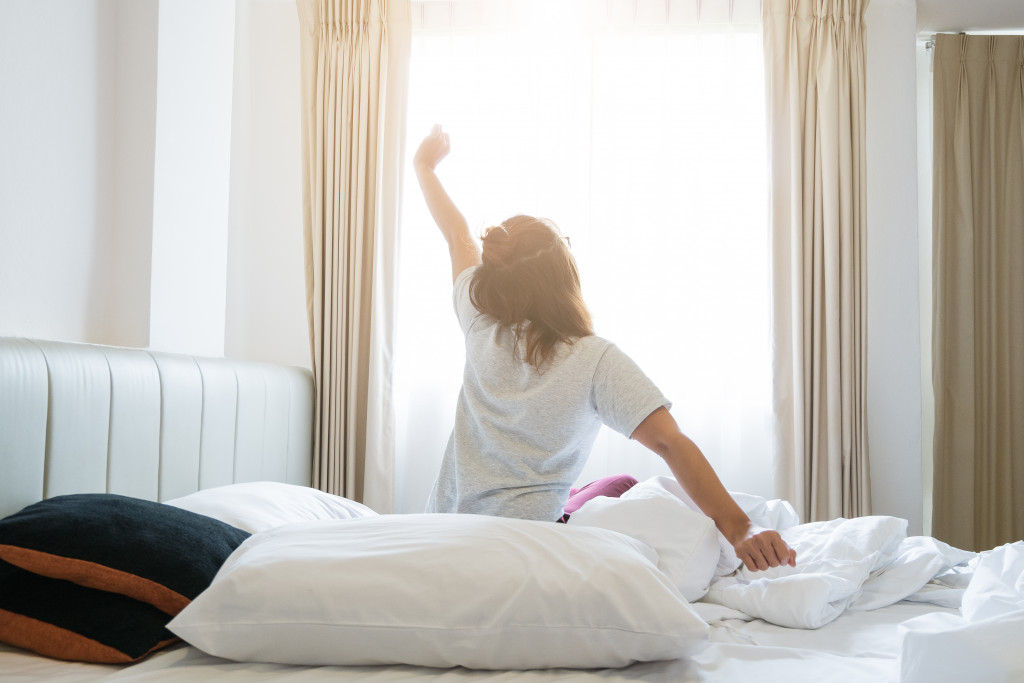It’s no secret that the busy generation is sleep-deprived. You are always on the go, and there is always something that needs to be done. Whether it’s work, school, or hobbies, you never seem to have enough time in the day. As a result, many people sacrifice sleep to get everything done. But people don’t realize this is only making things worse.
Lack of sleep leads to fatigue, which makes it harder to focus and be productive. And according to WebMD, chronic or regular sleep deprivation can increase a person’s risk of heart diseases, high blood pressure, and diabetes. Therefore, it’s undeniable that to function best, you need to ensure you are getting enough rest. Here are five tips for improving your sleep:
1. Establish a regular sleep schedule.
Your body functions best when it has a routine. Most people need between seven and eight hours of sleep per night to perform at their best. However, busy schedules can make it challenging to get the necessary amount of rest.
A regular sleep schedule can help improve your sleep despite a busy schedule. One way to do this is to go to bed and wake up at the same time each day, even on weekends. A sleep routine makes it possible to sleep better even when your mind is active during the day.
2. Ensure that your sleeping environment is comfortable.
Many people do not get enough restful sleep on a nightly basis. Several factors, such as stress, noise levels, and discomfort, can contribute to this. However, one of the most important factors is the sleeping environment. Creating a space that is comfortable and conducive to rest can make a big difference in the quality of sleep.
Here are a few things to keep in mind when creating a comfortable sleeping environment.
- The space should be dark, quiet, and cool. This will help the body to relax and prepare for sleep by winding down for 30 minutes before bedtime in a dimly lit room.
- Choose a mattress and pillows that are supportive and comfortable.
- Limit screen time before bed, as the light from electronics can interfere with the body’s natural sleep cycle.

3. Use an oral sleep appliance.
Chronic snoring and sleep apnea can significantly impact the quality of sleep. People who snore heavily or have sleep apnea often experience interrupted sleep, which can lead to fatigue and problems with focus and productivity. In addition, chronic snoring and sleep apnea can increase a person’s risk of developing other health problems such as heart disease, high blood pressure, and diabetes.
If you are looking for a way to improve your sleep and the disturbance is often caused by sleep apnea or chronic snoring, oral appliances such as the Elastic Mandibular Advancement (EMA) sleep device are worth trying. An EMA sleep device is a small mouth appliance worn during sleep. It works by holding the tongue in a forward position, keeping the airway open, and preventing snoring. These mouth appliances are safe, comfortable to wear, and easy to care for. Most importantly, they are highly effective in improving your sleep.
If you are looking for an EMA sleep device, be sure to consult with your dentist or doctor to find the best option for you.
4. Avoid caffeine and alcohol before bedtime.
Caffeine and alcohol are two common substances people turn to when they want to fall asleep fast. However, both of these substances can actually have the opposite effect, making it more difficult to fall asleep and stay asleep throughout the night.
Caffeine is a stimulant, which means that it can cause wakefulness and interfere with the body’s natural sleep cycle. Alcohol, on the other hand, may help you fall asleep initially, but it prevents deep sleep and leads to frequent awakenings during the night. As a result, you may find yourself feeling tired and groggy the next morning.
If you’re struggling to get a good night’s sleep, avoiding caffeine and alcohol before bedtime can help improve your sleep.
5. Practice some relaxation techniques.
Regardless of how busy your schedule is, it’s crucial to find time to relax and de-stress before bed. This can be difficult to do when juggling a job, family, and social life, but relaxation benefits are well worth the effort.
Relaxation techniques can help to slow your heart rate and breathing, lower your blood pressure, and ease muscle tension. All of these effects can lead to better sleep. In addition, relaxation can help to reduce stress and anxiety, two common culprits of insomnia.
You can get more sleep and wake up feeling refreshed and rested by taking some time to relax before bed.
If you find it difficult to get enough rest, don’t despair—you’re not alone! Many people find it hard to balance obligations with the need for rest. However, skimping on sleep will only make things worse in the long run. It’s essential to find ways to improve your sleep so that you can function at your best. By following these five tips, you’ll be off to a great start!


